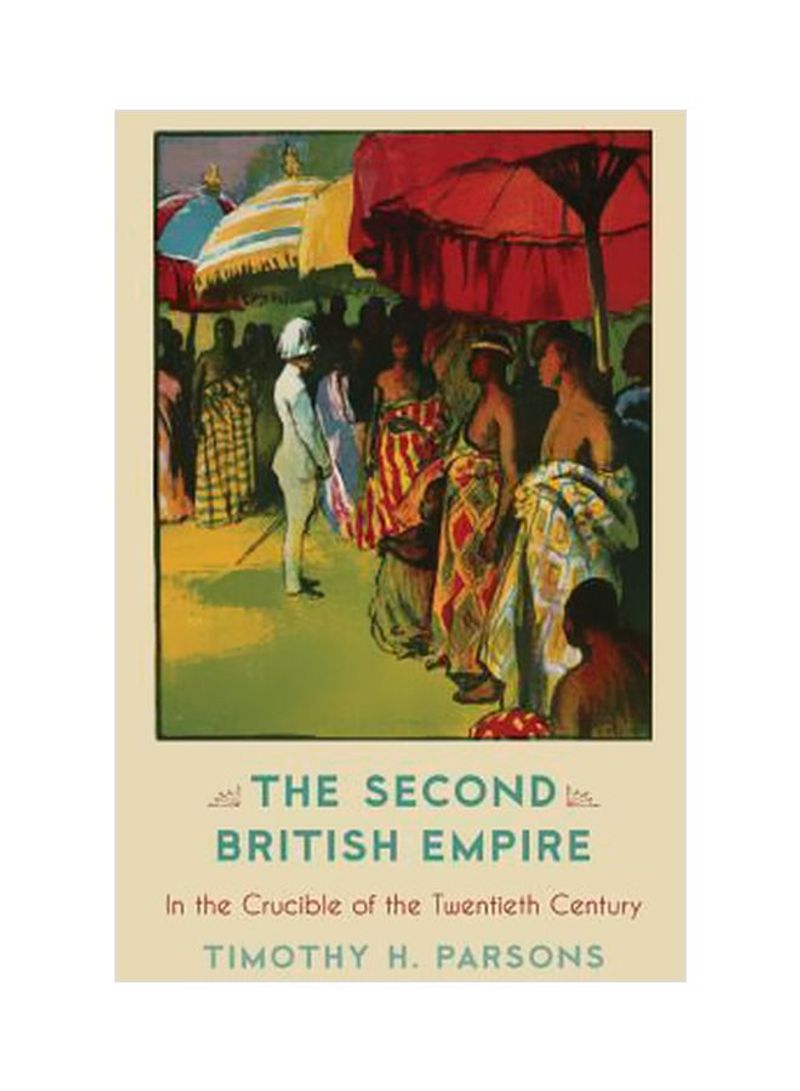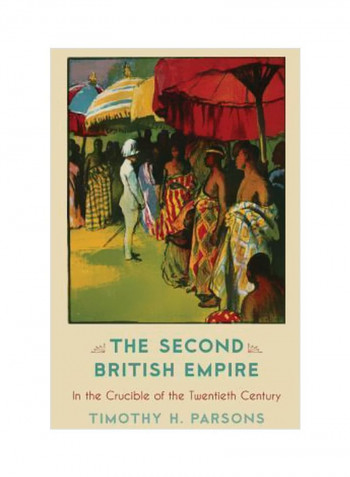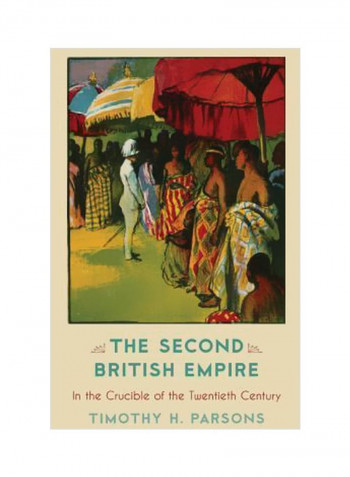The Second British Empire : In The Crucible Of The Twentieth Century Hardcover
Recommend
Sort by
Rating
Date
Specifications
Author 1
Timothy H. Parsons
Book Description
At its peak, the British Empire spanned the world and linked diverse populations in a vast network of exchange that spread people, wealth, commodities, cultures, and ideas around the globe. By the turn of the twentieth century, this empire, which made Britain one of the premier global superpowers, appeared invincible and eternal. This compelling book reveals, however, that it was actually remarkably fragile. Reconciling the humanitarian ideals of liberal British democracy with the inherent authoritarianism of imperial rule required the men and women who ran the empire to portray their non-Western subjects as backward and in need of the civilizing benefits of British rule. However, their lack of administrative manpower and financial resources meant that they had to recruit cooperative local allies to actually govern their colonies. Noted historian Timothy H. Parsons provides vivid detail of the experiences of subject peoples to explain how this became increasingly difficult and finally impossible after World War II as Africans, Asians, Arabs, and West Indians rejected the imperial notion that they were inferior and refused to be ruled by foreigners. Yet he also shows that the transformation of the British colonies into nation-states was not just a transfer of political power. The new postcolonial societies blended British political, economic, and social institutions with local norms and values in the new nations, while mass migration to Britain from the non-Western parts of the Commonwealth created a much more diverse and plural metropolitan society. This book tells the dramatic story of how the British Empire and its demise accelerated and strengthened globalization by creating webs of commerce, migration, and cultural exchange that linked Britons and their former subjects in new ways and produced blended transnational cultures that were British in origin but no longer British in character or style.
ISBN-13
9780742520509
Language
English
Publisher
Rowman And Littlefield
Publication Date
7/Aug/14
Number of Pages
282
About the Author
Timothy H. Parsons is professor of African history at Washington University.
Editorial Review
Parsons offers fascinating insights into the last decades of British colonial rule and, especially, its long-lasting effects both abroad and at home. In interesting and nuanced ways, the author demonstrates the ways in which imperial rule altered the attitudes, culture, music, and cuisine of colonial peoples and British society. By examining the inherent contractions of empire in the 20th century, Parsons not only demonstrates the complex nature of empire but also provides a better template for judging who benefited and who lost in the development of European empires. He argues that a two-way dialogue existed within the British Empire and that colonized people did 'speak back,' but too often, the British muted or ignored their voices. Parsons's broad approach allows him to usefully analyze the influence of empire on the processes of globalization. A welcome addition to a growing body of work that examines the final decades of the British Empire for specialists and students alike. Summing Up: Highly recommended. All levels/libraries. * CHOICE * Timothy Parsons has written a wide-ranging survey of the British Empire in the twentieth century rich in detail. . . . Throughout, Parsons is careful to note competing views and factions both within the British governments of the time and in the various regions of Africa and the Indian subcontinent, as well as when considering developments in Ireland and the West Indies. . . . Skillfully written, this book . . . could become a standard survey on the subject. [It] stands as a superb detailed overview of the major regions of the Empire * International Journal of African Historical Studies * Parsons does an admirable job. . . . He shows there was never one unified, tidy imperial system in any decade or era, let alone century. . . . Exploring the great variety of colonial configurations in each imperial locale, he demonstrates clearly that this was an empire beset by acknowledged weakness, in absolute numbers as in real power. Roaming around the globe decade by decade, Parsons chronologically categorizes the bewilderingly wide-ranging power dynamic social groups experienced in Africa, Ireland, India, the former Ottoman Empire, and elsewhere. . . . As British history, this is sound, descriptive scholarship. . . . Exploring the disordered power relations of empire since 1900, this book is an archival goldmine of the imperial experience. * Journal of British Studies * Timothy Parsons's highly readable new study of the British Empire during the twentieth century begins, fittingly enough, at the end, with the handover of Hong Kong in 1997 and, seemingly, the final collapse of Britain's formal imperial power. Yet, Parsons is too subtle and nuanced a scholar to let the story drop with the ceremonies in Hong Kong. Ultimately, as Parsons is well aware, one could conclude the story of the British Empire in many different ways, and he offers several more possibilities in the course of the book, from the tragedy of the children of immigrants blowing themselves up on the London subway to powerful tales of archival transfer, loss, and resuscitation that have accompanied transfers of political power. . . .Overall, for those who wish to introduce undergraduates to the twists and turns of British imperial power in the twentieth century-which Parsons persuasively portrays as decidedly non-linear-this engaging (and, happily, affordable) book represents a welcome opportunity to do so. * Journal of African History * Parsons provides a lucid account of the late-nineteenth century `high' period of British imperialism before moving on to describe the Empire's subsequent decline and collapse.... [T]he book is a lively, readable survey of an important topic. * Journal of Contemporary History * [A] well-written and carefully argued work. . . . Parsons' approach is firmly narrative, though he is attentive to important issues such as gender, race, trade and migration throughout the book. The book is also primarily a political history of the British Empire, with politics understood in the broad rather than narrow, high political sense. . . . While the book's focus is the British Empire, Parsons does contextualize its history within the broader global decline of empires in the twentieth century. In his view, twentieth-century empires' cohesion was illusory. . . . [He] persuasively demonstrate[s] that the surface power and cohesion of twentieth-century empires, including the British Empire, masked deeper internal weaknesses and a vulnerability to the forces of globalization. * Journal Of Colonialism and Colonial History * Timothy Parsons has written an important and impassioned study of the twentieth-century British Empire that provides fresh and powerful evidence of its exploitative character and the resistance it provoked among subject peoples. Comprehensive in its coverage, compelling in its analysis, and unflaggingly readable, this is a book that students and specialists will find equally rewarding. -- Dane Kennedy, George Washington University Writing with his characteristic verve, Timothy Parsons has produced a thorough and decisive history of Britain's Empire in the twentieth century that shows the impact of imperial expansion both on the colonies and on Britain itself. Ranging from music to politics, from food to slum dwellings, from economics to migration, Parsons shows both the limits of British power and the considerable material effects it wrought throughout the world. Critical, intelligent, and far-reaching, The Second British Empire is a welcome and important addition to a growing literature on the final decades of British imperial rule. -- Philippa Levine, University of Texas at Austin The Second British Empire features an engaging narrative and a deeply nuanced understanding of the complexities of imperial rule and the processes of decolonization. Everyone interested in Britain's fraught relationship with its colonies will find this book an illuminating read. -- Tammy M. Proctor, Utah State University



